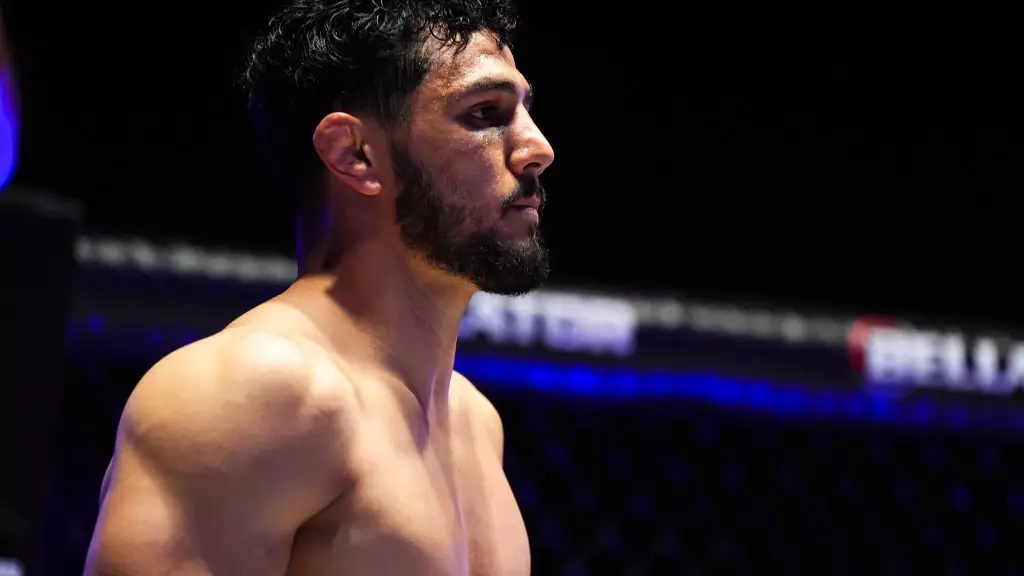In the world of mixed martial arts, the quest for opportunities can often lead to conflicts between athletes and promotional organizations. This is the predicament Aaron Pico currently faces as he seeks to transition from the Professional Fighters League (PFL) to the Ultimate Fighting Championship (UFC). Despite a successful career marked by a notable victory over Henry Corrales in February, Pico’s aspirations are stifled by contractual obligations that have made his path forward anything but straightforward. This article examines the nuances of Pico’s career situation, the impact of promotions on fighters, and the broader implications on the sport.
Aaron Pico boasts an impressive record of 13 wins and 4 losses, making him one of the notable talents in MMA today. However, his contract with the PFL has become a hindrance rather than a catalyst for growth. Pico expressed his desire to sign with the UFC, yet he finds himself entangled in a contractual clause that grants the PFL matching rights for any offers he may receive. As he candidly stated, “I am a free agent, but there’s only one little thing… that PFL has the right to match any offer I receive.” This contractual stipulation raises important questions about fighter autonomy and the treatment of mixed martial artists under promotional agreements.
The contractual landscape of professional sports is often complex and can lead to challenging situations for athletes. While Pico’s plight may seem like a uniquely frustrating experience, it reflects a broader industry trend in which fighters find themselves at the mercy of their promotional organizations. The binding nature of these contracts can stifle career growth and negatively affect a fighter’s mental health, as they grapple with unfulfilled promises and stalled opportunities.
Pico’s frustrations extend beyond contractual limitations. He recounted a series of instances where he was led to believe that he would be granted title shots or new contract opportunities, only to have those expectations dashed. In conversations with PFL co-founder Donn Davis, promises were made regarding championship bouts and locations for fights. For instance, Pico vividly recalls a discussion on their flight back from Saudi Arabia, where he was assured a title fight in California—his home state. Despite optimistic assurances, he was met with cancellations and a lack of communication, leaving him feeling unsettled and betrayed.
Such a pattern of broken promises raises crucial concerns about accountability within promotional organizations. Fighters, like Pico, invest not just time and energy into their training and careers but also their financial stability, as the consequences of inactivity can be substantial. Every canceled fight delays a potential payday and career advancements. The reliance on verbal commitments can lead to significant emotional tolls when those commitments are not honored, as seen in Pico’s experience.
As Aaron Pico navigates his current situation, he remains hopeful for a future with the UFC. He believes that the organization represents an environment with greater opportunities and the chance to compete against some of the best athletes in the sport. However, he is bogged down by the exclusive matching period dictated by his PFL contract, a term that could prolong his inactivity significantly.
Pico urged Davis to grant him a full release, expressing the urgency of his situation by stating, “Donn Davis can just give me my release and say you’re free to go to true free agency.” The challenge lies in the dichotomy between the business interests of promotions and the aspirations of fighters seeking growth and opportunity. Pico’s fervent desire to compete at the highest level exemplifies the dreams of many athletes who feel constrained by their contractual obligations.
Pico’s experiences are emblematic of a larger issue facing mixed martial artists today. As they strive for recognition and opportunity, they must navigate the intricacies of contractual agreements that often limit their freedom. The ability to switch organizations can prove critical for fighters who seek to elevate their careers, just as success often depends on fighting the right opponents at the right time.
Moreover, it reveals the essential need for open dialogue and clear communication between fighters and promoters. As the sport evolves, there is growing momentum for reform in how contracts are structured. Fighters must be afforded the flexibility to pursue opportunities without being unduly restrained by the organizations that claim to support their careers.
Aaron Pico’s situation serves as a significant case study for the ongoing discourse around the rights of mixed martial artists. His journey underscores the need for better structures that prioritize athlete well-being and career advancement. As the landscape of MMA continues to evolve, it is imperative to create a system that not only recognizes the immense contributions of fighters but also empowers them to chart their own paths to success.

